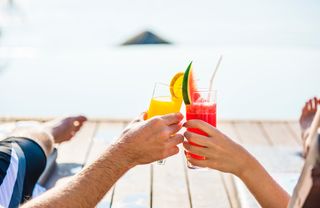Alcoholism
Is Alcohol Impacting Your Relationship?
Think back to the biggest arguments in your marriage. Were they alcohol-induced?
Posted May 10, 2019 Reviewed by Gary Drevitch

During an interview on the popular podcast The Tim Ferriss Show, entrepreneur Sir Richard Branson suggested a simple yet important thought experiment to listeners. We'll paraphrase it here:
Think back to the few biggest mistakes or arguments of your marriage. Now think how many of them occurred when one or both of you were under the influence of alcohol.
Does your answer surprise you? Perhaps—but it wouldn't surprise psychological researchers. Studies consistently show that drinking can negatively affect relationships.
So what does this mean? Should you never drink again in order to save your marriage? Not necessarily, but it's important to understand how alcohol can affect people and the way they relate to others. Doing so will help you reduce the risk of beer, wine, or liquor degrading the health of your relationship.
[Disclaimer: For the purposes of this post, we are not explicitly talking about alcoholism, also known as alcohol use disorder. Alcoholism is serious, prevalent, and treatable, but it is beyond the scope of our discussion here. If you believe alcoholism is affecting you or a loved one, please seek help. Contact a local resource or call the National Institute on Drug Abuse (NIDA) at 1 (800) 662-HELP (4357).]
3 Reasons Why Alcohol Could Be Affecting Your Relationship
Alcohol isn't necessarily the big bad wolf. But if you aren't aware of how it can affect you, your partner, and your interactions, it definitely can bite. Here are three key reasons why alcohol so often affects people in negative ways:
- It's a drug. By definition, alcohol (even in small amounts) can alter a person's emotions, perception, and thought process. A known depressant, alcohol can lower your mood and inhibitions—a potential recipe for faster-to-fight situations between you and your partner.
- It enjoys a cultural "pass." Alcohol is widely accepted in the culture. Consciously or not, we often downplay its negative effects and view it as an almost mandatory aspect of celebrating, de-stressing, and so on. Case in point: Have you ever said something like: "I only said that because I was drunk," "We only fight when we've been drinking," or "We can't celebrate our anniversary without wine?" These could be red flags that you're failing to recognize the power that alcohol can have on you and your partner.
- Its psychological effects directly influence social interaction. We already alluded to the idea that alcohol can impact your mood. To be more specific, heavy or even moderate drinking can cause a person to be more aggressive, disinhibited, defensive, sensitive, and irrational. These psychological effects can persist even after alcohol is out of your system, and in the long term can change brain function.
5 Ways to Reduce the Effect of Alcohol on Your Relationship
Let's say you've identified alcohol as a negative influence on you and your partner: It's fueled arguments, nit-picky behaviors, and otherwise unloving interactions, even if only slightly and occasionally. So, how can you start mitigating the effects within your marriage or partnership? Consider these five tips, realizing that some may be more or less feasible for you personally than others:
- Commit to drinking responsibly. For men, that means up to two alcoholic beverages per day. For women, it's up to one. Remain present and really enjoy your drink. Make a ritual of it, such as toasting each other and saying something you feel grateful for before going bottoms up. If you do this, the recommended daily maximum should be more than enough.
- Consider only imbibing when you're out of the house. The added expense of buying priced-up alcohol at a bar or restaurant may help you curb the habit. Plus, sitting around at home drinking in a familiar environment can often fuel unnecessary conflict or excessive consumption. (It goes without saying that if you are drinking out of the house, you're always ensuring you have a safe ride home.)
- Complete a sober month together. Made famous by "Dry January," sober months are growing in popularity. In addition to boosting your mood and helping you save money, research shows that going alcohol-free for 30 days can improve sleep, blood sugar and cholesterol levels, weight, and liver function.
- Go on more alcohol-free dates. Spending quality time together doesn't have to involve a bottle of wine. Try going out to breakfast, taking a hike, swimming, or doing some other activity where alcohol won't be missed.
- Designate one or more days of the week as alcohol-free. If the thought of going a month without alcohol sounds unpleasant, start with one day. Hopefully, you and your partner will notice the benefits and feel inspired to add a few more days to your rotation. (We highly recommend creating a catchy phrase to make it more fun and "stickwithable"—like Wine-Free Wednesday or Sober Sunday.)
Your ability to enjoy alcohol is ultimately predicated on how well you can do so responsibly. And it's up to you and your partner to decide if and how alcohol can maintain a place in your relationship. The good news is that cutting back on your consumption offers far more benefits than the challenges it may present . . . and just imagine how nice it would be to never have to live through another hangover.
Facebook Image Credit: Iakov Filimonov/Shutterstock


